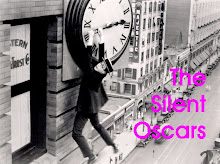 I was chatting this last weekend with Thingy over at Pondering Life—she says she's hit a bit of a dry spell recently, blog-wise (not so's you'd notice, but I'll take her word for it), and she got to wondering what other bloggers do, whether they bank up a supply of future posts to dip into or just ride out the storm.
I was chatting this last weekend with Thingy over at Pondering Life—she says she's hit a bit of a dry spell recently, blog-wise (not so's you'd notice, but I'll take her word for it), and she got to wondering what other bloggers do, whether they bank up a supply of future posts to dip into or just ride out the storm.Me, I type up notes on movies as I think of them, but I never polish anything in advance, which is why I tend to break those long essays into six parts—otherwise, I'd wind up posting once a month. The problem for me is I have some 50,000 words worth of notes (more than a hundred typed pages) that I'm unlikely ever to get to, fragments about Hitchcock, Capra, Cary Grant, etc.
 So Thingy suggested that once a week I post one of these random, unpolished fragments. Okay, I will. We'll call it "That's Typing Tuesday," from Truman Capote's famous quote—"That's not writing, that's typing"—about the novel On The Road. Which may not have been a fair reading of Jack Kerouac but is certainly a fair description of what I'll be offering up—not only future movie posts, but poems, fiction, grocery lists, what have you.
So Thingy suggested that once a week I post one of these random, unpolished fragments. Okay, I will. We'll call it "That's Typing Tuesday," from Truman Capote's famous quote—"That's not writing, that's typing"—about the novel On The Road. Which may not have been a fair reading of Jack Kerouac but is certainly a fair description of what I'll be offering up—not only future movie posts, but poems, fiction, grocery lists, what have you.I tend to think in phrases and ellipses, which I later fill in with something we like to call grammar. Grammar will not be much in evidence here on Tuesdays. Neither will tact, which I insert along with the grammar. These are unedited thoughts transferred directly from my frontal lobes to my word processor and now to my blog. Don't choke on it.
To give you a taste of what's to come, here are the four fragments I shared with Thingy on her blog:
 Cary Grant (North By Northwest)
Cary Grant (North By Northwest)ad man ... expedient lie—thinks it's amusing ... floats above life, untouched by it ... "rot" ... Roger O. Thornhill— "O" for "nothing" ... the CIA (or is it the FBI? "We're all part of the same alphabet soup.") teaches him the hard way the real consequences of the "expedient" lie ... and thus underneath all the movement and brilliant action sequences is the story of a man discovering he actually gives a damn ...
 The Apartment
The Apartment... I've read some complaints that the happy ending is contrived and tacked on, to which I say if you want to see a man sell his soul for a career in mid-level management, don't bother buying a theater ticket, just go to the office on Monday. There are millions of those guys walking around, and some of them are selling their souls for a whole lot less than a corner office with three windows. Movies—the ones we remember beyond a single award season—get made about the one in a million guy, whoever he is, and that's as it should be.
Psycho And The Problem Of Endings
I think Hitchcock was reacting to the critical and commercial drubbing Vertigo took ... "You want me to spell it out for you?" he seems to be saying, "I'll spell it out until you're begging me to stop" ... and he just keeps going and going, belaboring the issue long past the point where we care, and then he goes some more, just so Alfred Hitchcock can give his audience the finger.
It's the one significant flaw in an otherwise perfect movie ...
 Psycho
PsychoNorman has mother issues. Well, don't we all. At least he can keep his in the fruit cellar.
In the future, you'll get one fragment. One fragment only, Vasili.
Next Tuesday: The Sound of Music
Postscript: I finished the final part of my essay about the films of 1915 last night, but too late to post it. I guess I could have posted it this morning, but you can't very well start a series called "That's Typing Tuesday" on Wednesday. So the 1915 essay gets pushed back, to either this afternoon or tomorrow morning.






7 comments:
Absolutely inspired, this answers a question I've had regarding all those orphan posts I put on paper or exist as drafts on my blog. Great to know I'm not the only one with more ideas than I can turn into a post.
It's a beautiful thing. Love it. : )
Niice, what an inspiring post.
(like the Jack Lemmon Photo!)
My favorite thought on Psycho's ending is from Ebert's review of Van Sant's remake:
"By having a psychiatrist (Robert Forster) reproduce a five-minute speech of clinical diagnosis at the end of the film, Van Sant demonstrates that a completely unnecessary scene in the original, if reproduced, will be completely unnecessary in the remake as well."
As for what I do - well, I never have problems getting the stuff written, given my formats. What I have problems with is finding times to re-watch the films, so I sometimes end up with big delays between posts.
Thanks, guys! Hopefully you'll find future ramblings as interesting.
What I have problems with is finding times to re-watch the films, so I sometimes end up with big delays between posts.
This is also a problem for me, especially now that I've gone back to the silent era. At least with the sound era, I have a pretty good idea of what I thought was worthwhile. With the silent era, I pretty much have to watch everything.
Right now I'm re-watching Intolerance, which I have seen, but not since November, which is too long ago to write much about it.
At least it has the virtue of being something I want to see again ...
yeah, and thingy's right, and you're right, and here's Jack, TYPING, on the Steve Allen show i believe it was
Post a Comment